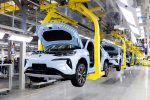
Official: Biden Admin Imposes 102% Tariff on Chinese-Made EVs, Computer Chips, Medical Products
Just yesterday we reported that Biden could impose a 100% tax on Chinese EVs (electric vehicles) imported to the US. Now, it is official – the Biden administration has implemented major tariff increases on a range of Chinese imports, spanning electric vehicles, computer chips, and medical products. This move, unveiled by U.S. President Joe Biden, signals a willingness to confront China’s economic practices, despite the potential for a standoff with Beijing and amidst ongoing trade tensions.
China swiftly responded, promising retaliation and emphasizing its opposition to the tariff hikes. The Biden administration’s decision maintains tariffs established during the previous administration while introducing new ones, notably quadrupling tariffs on electric vehicles to over 100%. The White House cited concerns about unfair Chinese practices flooding global markets with inexpensive goods, posing risks to U.S. economic security.
These measures target $18 billion worth of Chinese imports, encompassing various sectors such as steel, aluminum, semiconductors, batteries, and solar cells. The Biden administration justifies the tariff revisions, citing ongoing intellectual property theft by China and escalating cyber intrusions targeting American technology.
Despite the alignment with the premise of tougher trade measures set by the previous administration, the Biden administration criticizes the efficacy of Trump’s trade deal with China, asserting it did not boost American exports or manufacturing jobs. The new tariffs are described as carefully targeted, coupled with domestic investment and coordination with allies, with the intention of not exacerbating inflation or inviting significant retaliation from Beijing.
Biden’s approach marks a departure from the free-trade consensus of the past, reflecting a shift in U.S. trade policy towards a more assertive stance against perceived unfair economic practices. The administration aims to balance competitiveness with China without sparking a full-blown trade war, although tensions remain high.
The tariff updates include increases on various goods such as EVs, lithium-ion batteries, photovoltaic cells, critical minerals, and medical equipment. Further tariff hikes are planned for the coming years, targeting additional products like semiconductors, graphite, and rubber medical gloves.
Lawmakers have expressed support for more aggressive measures, including calls to ban Chinese EVs altogether due to concerns over data security. Treasury Secretary Janet Yellen emphasized the widespread concern among U.S. allies regarding China’s economic practices, framing the actions as necessary to prevent economic harm stemming from unfair practices rather than anti-China sentiment.


